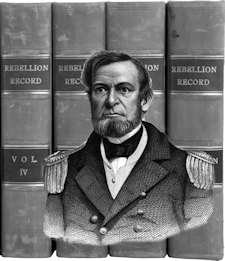January 12.—A party of rebels, belonging to the command of Colonel Hammond, burned the depot and a blacksmith’s shop, and took all the goods from the store of Mr. Mustain, at Horse Cave, Ky. They also burned the Woodland Depot at Cave City, the Cave City Hotel, and stables. The citizens at all these points were notified, and escaped to Munfordville, as the rebels stated that they intended to return on Monday night and burn every house that could be used by the Union army in its advance as a hospital or quarters. They also burned up all the hay, oats, and fodder-stacks along the road, and drove off or killed all the cattle, horses, and mules to be found.
—A Nephew of the rebel General Polk was arrested to-day near Blandville, Ky., by one of the National scouting parties. He had despatches in his possession to spies at Columbus, Ky.—N. Y. Herald, January 14.
—The United States sloop-of-war Pensacola ran the rebel batteries at Cockpit and Shipping Points, on the Potomac, this morning, and reached the open sea without having been touched by shot or shell.
—A reconnoitering party under command of Lieutenant W. T. Truxton, U. S. N., left St Helena Sound, S. C, day before yesterday, and visited Bailey’s Island, but found it entirely deserted, though well stocked with cattle, sheep, and horses. They visited many fine plantations, and yesterday marched to Bailey’s Landing on the North-Edisto River, but met with no adventures. They returned to the Sound this afternoon.
—The advance of General Burnside’s Expedition to the coast of North-Carolina, sailed from Fortress Monroe, Va.
—The Twenty-fourth regiment of Kentucky Volunteers, under the command of Colonel Grigsby, passed through Louisville, on the way to the seat of war.—Louisville Journal, January 13.
—Brigadier-general Sigel issued an address to the officers of his command in camp near Rolla, Mo., instructing them to give continuous and strict attention to all matters relative to the condition and treatment of the sick. He also directed the commanders of companies to occupy their commands by regular drills, and by practical and theoretical instruction in military affairs. The officers of regiments were recommended to form military associations for discussing all subjects relative to their common interest and the good of the public service. Such a course, the General thinks calculated to produce harmony of action and feeling among the officers of the same regiment—(Doc. 14.)


